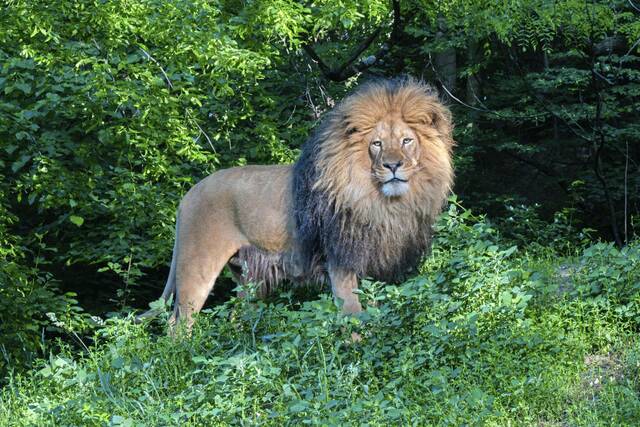https://triblive.com/news/world/hold-your-horses-danish-zoo-seeks-domestic-animals-as-fodder-but-u-s-zoos-eschew-practice/
Hold your horses: Danish zoo seeks domestic animals as fodder, but U.S. zoos eschew practice

The way lions, tigers, bears and eagles hunt, kill and ultimately eat their prey can be a grisly, brutal business that some humans prefer not to think about.
When these animals are kept captive in zoos and animal parks, they aren’t exactly spoon-fed meals.
In Denmark, people can donate their horses, chickens, rabbits and guinea pigs to the Aalborg Zoo to help feed the zoo’s predator animals. The program isn’t new, but when the zoo posted about it on Facebook late last month, there was a global gasp from the horror such table talk evokes.
“In zoos we have a responsibility to imitate the natural food chain of the animals — in terms of both animal welfare and professional integrity,” the post stated. “If you have an animal that has to leave here for various reasons, feel free to donate it to us. The animals are gently euthanized by trained staff and are afterwards used as fodder. That way, nothing goes to waste — and we ensure natural behavior, nutrition and well-being of our predators.”
The donations are tax deductible.
The post went viral, generating more than 3,000 reactions on Facebook.
The news, with the tantalizing headline “A Zoo in Denmark Wants to Feed Your Pets to Its Predators,” made it to The New York Times on Aug. 4. NPR also picked up the story.
“We understand that the post awakens feelings and interest,” the zoo wrote as it closed comments on the issue, “but hateful and malicious rhetoric is not necessary — and we urge you to preserve the good tone.”
One Danish commenter, for example, posted: “A deeply perverse and degrading mindset that is behind this sick invention, which has spread a terrible trend of indifference with animals in Denmark and this only supports this sad underdevelopment. Imagine giving away your pet/animal as fodder, it hardly gets more disrespectful and unworthy than that.”
Others, meanwhile, posted about the positive experience they had dealing with the zoo.
“This is such a fine arrangement. … I have delivered a rabbit to you and it was a super nice and professional experience,” another Dane posted.
“Good initiative rather than being thrown in the trash when they are not cute anymore, or the neighbor is tired of your hens suddenly getting roosters that are noisy and illegal within the city limits,” an Aalborg resident posted.
“Blimey you got so unpopular with this post. It is absurd how people — both in Denmark and internationally — have reacted,” another person wrote. “Personally, I think it’s a good measure that there is an alternative to animals being thrown away as garbage, especially since you die with care and humanity.”
The Danish zoo’s practice is unlikely to gain traction over here. The Pittsburgh Zoo and Aquarium does not accept animal donations from people, said spokesman Michael Schroeder.
The zoo does have a partnership with the Pennsylvania Game Commission to feed the zoo’s meat-eaters with large animal carcasses to simulate natural feeding and enrichment, he said. It also maintains a wishlist that people can use to buy food and other supplies for zoo animals.
At the national level, “this is nothing that we would endorse,” said Sarah Fedele, a spokeswoman for the Association of Zoos & Aquariums. “If it ever did come up in the U.S. it would be pretty controversial.”
But it does happen … in Oregon
In the hills of southern Oregon, there’s a drive-thru animal park called Wildlife Safari. It maintains a program similar to the one in Denmark. People in the area love it, said executive director Dan Van Slyke.
The Winston, Oregon, park is known for its cheetahs, Van Slyke said. And the cats don’t eat Cheetos.
“These carnivores don’t live on salad,” Van Slyke said. “They would die. They have to have meat and it has to come from somewhere.”
People who keep horses in the region tell Van Slyke they’re grateful for the program, which has been in place since the 1970s.
Wildlife Safari will pick up horses, euthanize them and use them as fodder for its cheetahs.
“Horse meat is a really good item for these animals,” he said.
Van Slyke emphasized Wildlife Safari’s commitment to the humane treatment of animals. The park is a member of the Association of Zoos & Aquariums and the Zoological Association of America.
“We’re animal people,” he said.
Copyright ©2026— Trib Total Media, LLC (TribLIVE.com)
